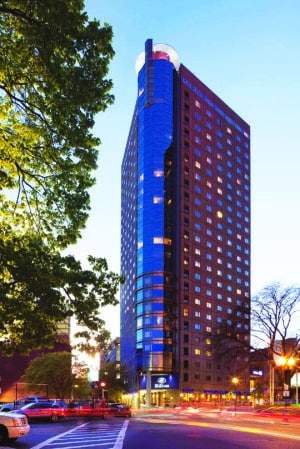
New York investment firm Certares and Belcourt Capital Partners bought the 390-room Hilton Boston Back Bay hotel in April for $171 million, citing Boston’s status as a “seven-day-a-week” lodging market attracting corporate and leisure travelers. Photo courtesy of Certares
The Massachusetts lodging sector remains very healthy. Revenues per available room performance is at an all-time high and hotels have evolved into a preferred commercial real estate asset class. Hotels have proven to be resilient through the post pandemic recovery and are generating strong profits and interesting investment yield opportunities for potential investors.
While the rise of interest rates has subdued transaction activity over the past year, some sellers are beginning to experience multiple stress points and with dry powder at or near all-time highs, transaction activity is likely to accelerate.
Operating performance across all hotels in Massachusetts remains very strong, reaching all-time highs in revenue per available room (RevPAR) performance. The recovery from the COVID-19 pandemic was largely led by vacation destinations, which witnessed significant growth from consumers seeking drive-to destinations from large population bases like Boston and New York.
However, operating fundamentals in these markets experienced moderation in the past year, due in part to unfavorable weather conditions such as a lack of snow in the winter in the mountains and an excessive number of rainy weekends at the beach. Let’s hope for fewer rainy weekends this summer!
Investment Activity Likely to Accelerate
Within the state, the Boston metro area has been a standout performer over the past year, with RevPARs increasing by over 10 percent. This growth has been primarily driven by the ongoing revival of business, group and international travel.
Our outlook remains optimistic for the Boston market, fueled by the continued recovery of group and convention travel, as well as an increase in global tourism particularly from inbound Asian travelers.
Additionally, the absence of any significant new hotel supply additions in the near future further supports this positive outlook.
In the past year, we have observed an increase in the number of hotels actively being marketed for sale. However, many of these marketing efforts have not resulted in actual sale transactions.

Alan Suzuki
Ample Debt from Multiple Sources
The majority of hotel sale transactions continue to occur in smaller deal sizes, ranging from $5 million to $25 million. These transactions predominantly involve local or regional owner-operators as buyers who are able to secure local bank financing through their established relationships.
In the coming year, we anticipate more transactions involving owners who are facing pressure points, such as impending loan maturities, private equity fund-life expirations and the need for property improvement plans. We have also noticed, over the past few months, a narrowing of the bid-ask spread between buyers and sellers to facilitate a transaction.
The local banks continue to provide ample liquidity and remain actively involved in the market primarily with their existing relationship customers. However, we have noticed in recent months that there has been an increased level of scrutiny on the property and location.

Matthew Enright
For borrowers seeking non-recourse execution for stabilized cash-flowing properties, commercial mortgage-backed securities (CMBS) have emerged as an appealing option for five-year, fixed-rate, interest-only loans. Moreover, the spreads on CMBS have notably contracted over the past year, making it an even more attractive option. Life insurance companies also selectively offer financing options for the best located assets.
Lastly, we have seen a significant influx of new funding sources, including newly formed debt funds and life companies that have introduced their own debt fund products into the market, providing borrowers with additional avenues for securing financing.
Alan Suzuki is managing director of capital markets and Matthew Enright is senior director of capital markets at JLL.






